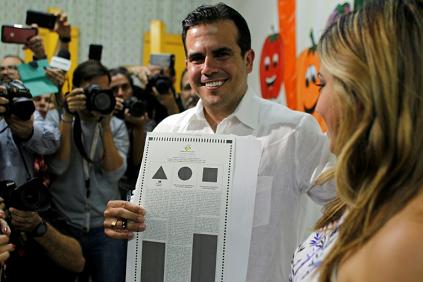by WorldTribune Staff, June 12, 2017
A bankrupt and desperate Puerto Rico on June 11 voted for full annexation by the United States.
Just 23 percent of the island’s 2 million eligible voters turned out for the referendum to cast a ballot in favor of the territory becoming a U.S. state, AFP reported.

Opposition parties who support the status quo had called for a boycott of the non-binding vote.
Puerto Rico, which has been an unincorporated U.S. territory since 1898, faces public debt of $73 billion and is mired in a stagnant economy in which 45 percent of the population lives in poverty.
President Donald Trump has several times argued against bailing out the territory.
The U.S. Congress would need to approve any change to statehood.
Puerto Rican Gov. Ricardo Rossello vowed to defend the result which showed that 97.2 percent of those who voted wanted statehood, 1.5 percent supported independence and 1.3 percent backed no change.
“We will go before international forums to defend the argument of the importance of Puerto Rico being the first Hispanic state in the United States,” Rossello said.
Rossello, who heads the pro-statehood New Progressive Party, said his government would fight “in Washington and throughout the world” for the Caribbean island territory to be accepted as the 51st U.S. state, and for Puerto Ricans to gain “all the same opportunities” as other American citizens.
The opposition Popular Democratic Party had said “statehood will win by a landslide” because of the boycott by opposition parties. The Puerto Rican Independence Party had called the vote a “farce.”
Puerto Ricans have been U.S. citizens since 1917. But they are not allowed to vote in presidential or congressional elections unless they reside in the mainland United States.
The June 11 referendum was the fifth on the territory’s status – dating back to 1967.
The question of status is “fundamental” to breaking free from economic turmoil, said Christian Sobrino, chief economic adviser to the Puerto Rican government.
“It is because Puerto Rico is in an unequal relationship” with the U.S. government that the bankrupt island’s finances are now under a largely U.S.-appointed control board, he told AFP.
Letters to the Editor __ Subscribe to Geostrategy-Direct __ Support Free Press Foundation
